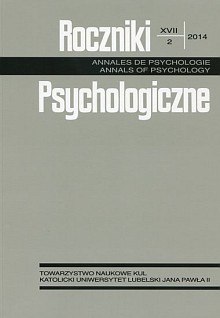On the (in)validity of the General Factor of Personality (GFP)
On the (in)validity of the General Factor of Personality (GFP)
Author(s): Bogdan Zawadzki, Jan StrelauSubject(s): Psychology
Published by: Towarzystwo Naukowe KUL & Katolicki Uniwersytet Lubelski Jana Pawła II
Keywords: General Factor of Personality (GFP); Five-Factor Model of Personality (FFM)
Summary/Abstract: The paper presents research on the validity of the General Factor of Personality (GFP), extracted on the basis of NEO-FFI scores. Analysis was based on data obtained in four groups consisting, in total, of 1906 participants (878 women and 1028 men aged from 18 to 66 years). Scores on Five-Factor Model (FFM) scales and GFP scores were analyzed against 15 selected criterion variables: the intensity of PTSD symptoms, schizotypal personality symptoms, general self-efficacy, conflict management styles (integrating, dominating, avoiding, compromising, obliging), and behavioral risk factors of somatic diseases (CND and cancer): Type A, Type 1, Type 2, and Type 4 personality as well as depressiveness, hostility, and submissiveness. The results indicated the structural weakness of the GFP (low reliability, unacceptable fit of the one-factor model to the structure of NEOFFI scales) and a high diversity of GFP validity. Comparative analysis of criterion variables for which both FFM and GFP scores had high validity with cases of variables showing high validity of FFM scores and low validity of the GFP allowed to identify the causes of the diversity of GFP validity. It is a result of low intercorrelations among FFM scales, which frequently creates differences between the pattern of intercorrelations of FFM scales and the pattern of their correlations with criterion variables. In the discussion the limited theoretical and empirical meaning of the GFP was underlined, especially when compared to the general g factor, used in research on intelligence, extracted from highly intercorrelated ability tests or even personality scales, which are based on highly correlated lower level subdimensions.
Journal: Roczniki Psychologiczne
- Issue Year: 17/2014
- Issue No: 2
- Page Range: 275-290
- Page Count: 16
- Language: English

